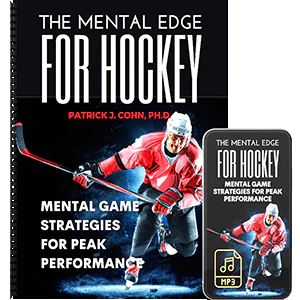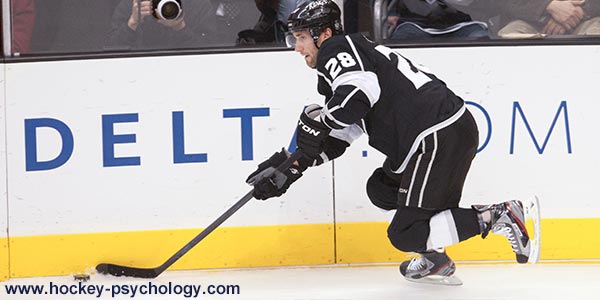How to Handle Criticism from Coach
Have you ever been called out by your coach for not working hard, lacking intensity, or not playing up to your ability level?
Criticism from your coach can be perceived as harsh–even embarrassing–especially when it takes place in front of your teammates.
Even constructive criticism from your coach can affect your confidence, motivation, effort and, ultimately, your play on the ice.
Sometimes, you might feel like you are being singled out or fear you might be benched.
When you react negatively to criticism your mindset changes, your physiology is altered and your play on the ice is negatively affected leading to more potential criticism.
By internalizing the criticism, you will, most likely, play tentatively.
You may fear one mistake will bring on more criticism so you play it safe rather than playing aggressively.
Playing it Safe Will Not Help you Play to your Ability
No matter the tone or content of your coach’s criticism, you need to learn how to deal with or process the criticism so you will be better able to maintain your confidence and focus on the ice.
Defenseman Kevin Shattenkirk of the New York Rangers was recently called out by his coach for under performing.
Shattenkirk was a huge free agent acquisition last summer for the Rangers and was expected to make a big impact this season.
Shattenkirk has five goals and 17 assists in 38 games and is on pace for his lowest offensive production since 2013-14. Shattenkirk even had a stretch of 11 games where he only had two points.
Rangers coach, Alain Vigneault, has called Shattenkirk “a work in progress” and has publicly noted that Shattenkirk has not lived up to his potential.
VIGNEAULT: “There’s no doubt that our expectations and [Shattenkirk’s] expectations are a little bit higher than we’ve seen so far.”
Shattenkirk often compounds criticism by becoming self-critical which further hurts his game.
SHATTENKIRK: “I’m definitely guilty of that. Last year in the playoffs was another example of me doing that, and doing it too much… there are times when I have to let myself off the hook a little bit and relaxed.”
Shattenkirk has decided to focus on his game rather than the criticism itself.
SHATTENKIRK: “It’s about not worrying about making mistakes. Trying to go out on that next shift and affecting the game in a positive way. That’s the mentality I have to keep the entire game.”
Criticism may hurt but it is one person’s opinion and it may have some degree of truth.
If you learn to sift through the delivery and some of the negative language, you may find some useful information that can improve your game.
You see, criticism is not always negative. There may be good positive feedback that you can utilize to play better on the ice. You just need to not allow the delivery to negate the message.
Try These Tips to Effectively Handle Criticism:
- Don’t allow the tone taint the value of the message.
- Don’t take it personally–as an attack on your person.
- Focus on the part of the message that can help improve your play.
Don’t allow criticism to be destructive. Criticism can be constructive if you look at it the right way.
And make sure your confidence doesn’t take a hit by learning how to control your confidence level with The Confident Athlete Audio program…
Related Articles on Hockey Mental Game:
- Your Mindset and Finishing Hockey Games
- Hockey Mindset for Peak Performance
- Mental Keys to Recovery for Hockey Players
*Subscribe to The Sports Psychology Podcast on iTunes
*Subscribe to The Sports Psychology Podcast on Spotify
The Mental Edge for Hockey

The Mental Edge for Hockey teaches you proven and simple mental game strategies so you can overcome fear of failure, lack of confidence, slumps or poor composure, take your practice game to competition, and boost your confidence in hockey. You learn simple, actionable mental game strategies to help you perform at your peak!
I’ve worked with athletes for 30 plus years – and know the top challenges that undermine performance when you perform in games. Now you can tap into my expertise and experience in coaching hockey players on the mental game.
In this program, you’ll learn the TOP 10 mental training lessons for hockey players – the same strategies I teach one-on-one athletes I coach on the mental game. My clients pay thousands of dollars for personal coaching, but now you can have the same strategies to improve your mental game – at a fraction of the price.

Leave a Reply